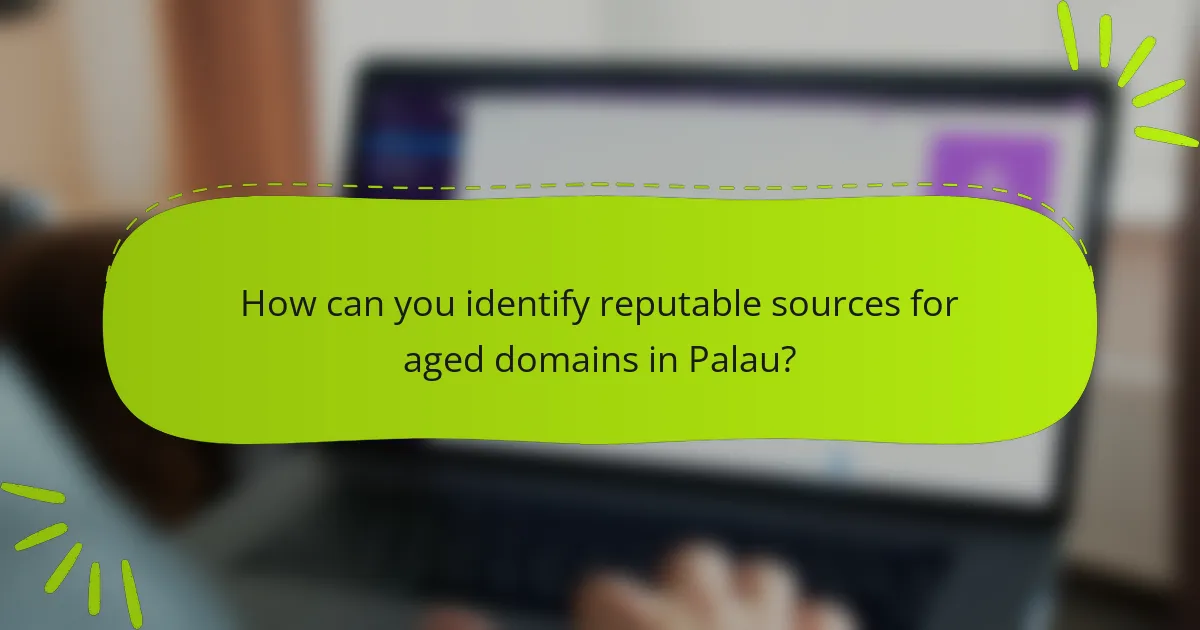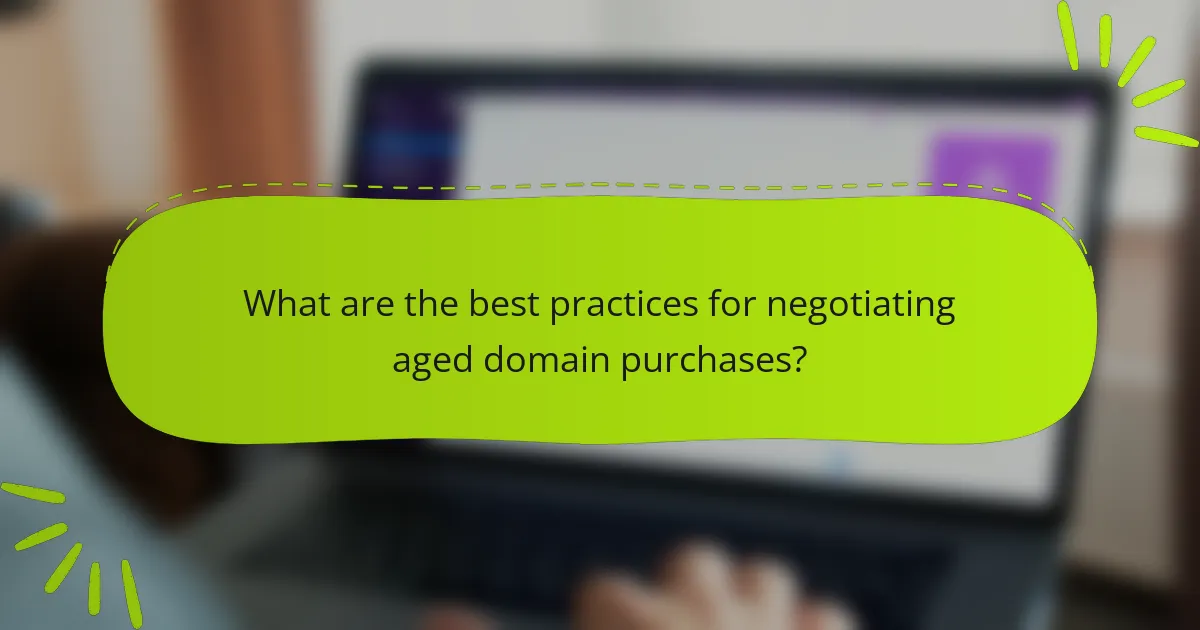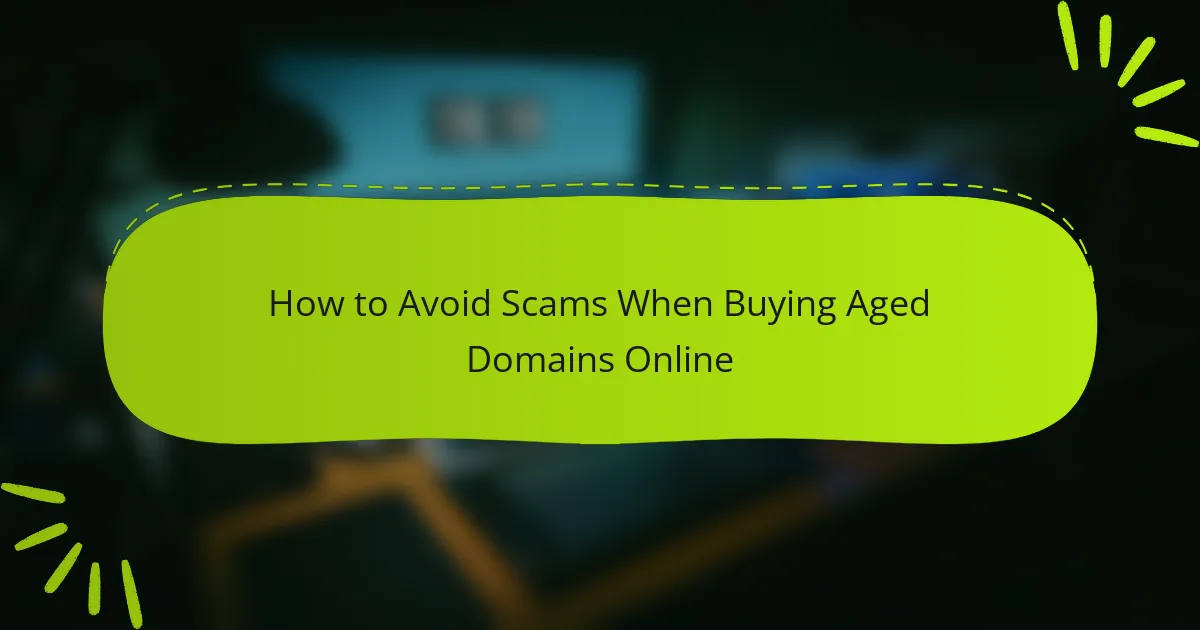When purchasing aged domains online, it’s essential to navigate the process carefully to avoid scams. Focus on reputable platforms with transparent histories and positive user reviews, while being vigilant for red flags such as unverifiable ownership and suspicious pricing. Utilizing online tools to verify a domain’s history can further safeguard your investment, ensuring it is free from spam or malicious associations.

How can you identify reputable sources for aged domains in Palau?
To identify reputable sources for aged domains in Palau, focus on established platforms known for their credibility and user reviews. Look for marketplaces that provide transparency about domain history and ownership.
Established domain marketplaces
Established domain marketplaces are platforms where users can buy and sell aged domains with a reputation for reliability. Examples include Sedo and Flippa, which offer user ratings and detailed domain histories. When using these platforms, check for seller feedback and ensure the site has a secure payment method.
Additionally, look for marketplaces that provide verification tools to confirm the authenticity of the domain’s age and previous ownership. This can help you avoid scams and make informed purchasing decisions.
Domain auction platforms
Domain auction platforms allow users to bid on aged domains, often featuring a wide selection. Sites like GoDaddy Auctions and NameJet are popular choices, providing insights into bidding history and domain valuation. Always set a budget to avoid overspending during the auction process.
Be cautious of auctions with unusually low starting bids, as these may indicate potential issues with the domain. Research the domain’s background before participating in any auction to ensure its legitimacy.
Trusted domain brokers
Trusted domain brokers can facilitate the purchase of aged domains by leveraging their industry knowledge and connections. Look for brokers with a strong track record and positive client testimonials. They can help you navigate the complexities of domain acquisition and provide valuable insights into market trends.
When selecting a broker, verify their credentials and ensure they are transparent about their fees and services. A reputable broker will also assist in conducting due diligence on the domain to confirm its age and history, reducing the risk of scams.

What red flags should you look for when buying aged domains?
When buying aged domains, it’s crucial to identify potential red flags that could indicate a scam. Key indicators include unverifiable ownership history, suspicious pricing, and a lack of customer reviews.
Unverifiable ownership history
One of the most significant red flags is an unverifiable ownership history. If the seller cannot provide clear evidence of ownership or a transparent transfer process, it may signal that the domain is stolen or encumbered.
Always check the domain’s registration details through a WHOIS lookup. If the information is private or masked, proceed with caution. Legitimate sellers typically have no issue sharing this information.
Suspicious pricing
Pricing that seems too good to be true is often a warning sign. If an aged domain is listed at a fraction of its market value, it could indicate that the seller is trying to offload a problematic asset.
Research similar domains to understand their typical price ranges. If you find significant discrepancies, consider it a red flag and investigate further before making a purchase.
Lack of customer reviews
A reputable seller should have a history of satisfied customers. If you cannot find any reviews or testimonials, it may indicate a lack of credibility.
Look for reviews on independent platforms or forums where users discuss their experiences. If the seller has no online presence or feedback, it’s wise to reconsider your purchase.

How can you verify the history of an aged domain?
To verify the history of an aged domain, utilize various online tools and resources that provide insights into its past ownership, website activity, and link profile. This process helps ensure that the domain has a clean history and is not associated with spam or malicious activity.
Using WHOIS lookup tools
WHOIS lookup tools allow you to check the registration details of a domain, including its creation date, previous owners, and contact information. This information can help you determine if the domain has been owned by multiple parties or if it has a long-standing history.
Look for reputable WHOIS services like DomainTools or Whois.net. Be cautious of domains that have frequent ownership changes, as this may indicate potential issues.
Checking archive services like Wayback Machine
The Wayback Machine is a valuable tool for viewing archived versions of websites. By entering the domain into the Wayback Machine, you can see how the site looked at various points in time, which can reveal its purpose and content history.
Examine the frequency and nature of the snapshots taken. A domain with a consistent and legitimate presence over several years is generally more trustworthy than one with sporadic or suspicious content.
Reviewing backlink profiles
Analyzing the backlink profile of an aged domain is crucial for understanding its reputation and authority. Use tools like Ahrefs or Moz to assess the quality and quantity of backlinks pointing to the domain.
A healthy backlink profile should consist of links from reputable and relevant sites. Avoid domains with a high number of low-quality or spammy backlinks, as these can negatively impact your future SEO efforts.

What are the best practices for negotiating aged domain purchases?
To negotiate aged domain purchases effectively, focus on understanding the market value, establishing a budget, and maintaining clear communication with the seller. These practices help ensure you make informed decisions and secure a fair deal.
Researching market value
Understanding the market value of aged domains is crucial for negotiation. Start by analyzing similar domains that have sold recently to gauge pricing trends. Tools like domain appraisal services can provide estimates based on factors such as domain age, keyword relevance, and traffic history.
Consider checking online marketplaces like Sedo or Flippa for comparable sales. This will give you a clearer picture of what buyers are willing to pay and help you avoid overpaying for a domain.
Setting a budget limit
Establishing a budget limit before entering negotiations is essential. Determine how much you are willing to spend based on your research into market values and your overall business goals. A budget helps you stay focused and prevents emotional decision-making during negotiations.
As a guideline, consider allocating a budget that is within the range of similar domain sales, allowing for some flexibility based on the seller’s asking price. This approach ensures you remain competitive while protecting your financial interests.
Engaging in direct communication
Direct communication with the seller can significantly enhance your negotiation outcomes. Reach out with a clear and respectful message expressing your interest in the domain, and ask any pertinent questions about its history and usage. This establishes rapport and may lead to a more favorable negotiation environment.
Be prepared to discuss your budget and the research you’ve conducted on market value. Transparency can build trust and may encourage the seller to consider reasonable offers. Always approach negotiations with a willingness to listen and adapt based on the seller’s responses.

What tools can help you assess the value of an aged domain?
To effectively assess the value of an aged domain, several tools can provide critical insights into its SEO metrics and backlink profile. Utilizing these resources helps ensure you make informed decisions and avoid potential scams.
SEMrush for SEO metrics
SEMrush is a comprehensive tool that offers a variety of SEO metrics essential for evaluating aged domains. It provides data on organic search traffic, keyword rankings, and domain authority, which can help you gauge the potential of a domain.
When using SEMrush, focus on metrics like the Domain Score and the number of organic keywords. A domain with a high Domain Score and a diverse keyword portfolio is generally more valuable. Be cautious of domains with sudden spikes in traffic, as this could indicate manipulation.
Ahrefs for backlink analysis
Ahrefs specializes in backlink analysis, making it a vital tool for assessing the value of aged domains. It allows you to view the backlink profile, including the number of referring domains and the quality of those links.
Pay attention to the Domain Rating and the types of backlinks. A strong backlink profile with links from reputable sites enhances a domain’s credibility. Avoid domains with toxic backlinks or those that have been penalized by search engines, as these can harm your future SEO efforts.
